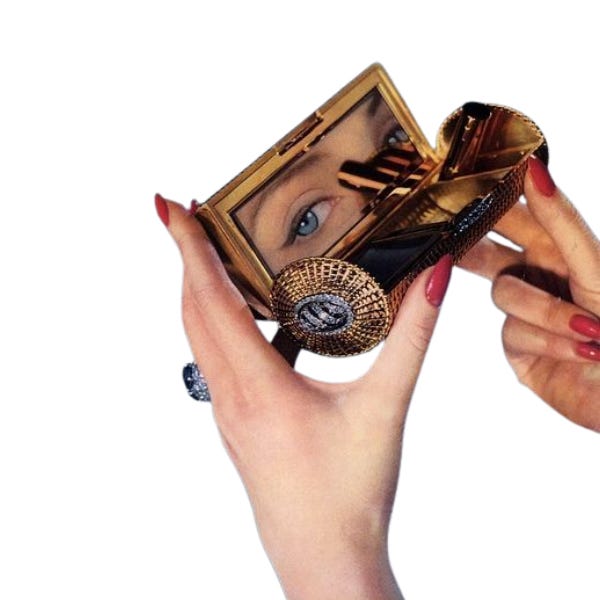My mind feels so very occupied currently with so many thoughts— I have so many stories of past unfinished novels swirling around in my head, fragments of songs, life admin tasks, future work projects, future life plans, at least five substack essays I’m currently writing… So I would like to just take a bit of mental respite. I thought to myself what’s something brings me peace? Chicness, naturally. All of it— the idea of being chic, witnessing an impossibly chic person, striving for it. It brings me such calm that one day I will realise my peak chicness—and, my goodness, the days that I get dressed up, leave the house and actually feel chic? Unreal. Feeling chic is like a balm for my soul, particularly in the colder months.
As British Vogue would have it, however, chic is dead.
Or rather, they are calling for its death. This will not stop me from writing about it, though.
Lauren O’Neill argues in this piece that chic has met the fate of many other overused words, its meaning having been slowly drained from it by excessive and negligent use on the part of the masses. Allegedly, chic used to denote a very specific feel, a very specific look, which the author talks of fondly in remembrance of times past:
…it did once have some typical markers. I’m thinking of a pair of heels and little black dress, or a cigarette smoked on a balcony in a glamorous city, or like, speaking French in a pair of sunglasses.
The problem is, O’Neill goes on to say, that now the word chic has come to be applied to too many things. While they concede that chic is about taste and taste can be subjective, they question whether there should be a limit to what the word could apply to. It seems that the word is no longer special since now everything can be chic. This is definitely one way of viewing this issue.
What is sounds like to me is a question of access. The people who previously had the right to define a term and set the standards for acceptable taste are now changing. The arbitrators of taste are perhaps sensing that they are losing their footing. If we acknowledge that anyone has the potential to acquire taste and opinions on what is tasteful can differ, what exactly is stopping someone from outside the establishment from setting their own standards for taste? Distribution of messaging is definitely a principal factor. How can the people know what you want to say if you have no means of mass communication? That may have been a problem for a while, but as we’re all very familiar, social media platforms (despite their algorithmic flaws) have given the opportunity for people regardless of their location in the world, education, social standing, or expertise, the ability to have their opinions showcased to potentially millions of people. O’Neill seems to take this as part of the the problem why ‘anything goes’ and writes of this shift power:
These days, however, if you want to prove that pretty much anything (the pub, not going to the pub, seafood, gardening) is chic, all you have to do is search TikTok and you’ll probably find someone saying so.
[emphasis added]
But did chic ever mean anything specific?
According to O’Neill, yes, in fact, it does objectively mean something— but something that is at its core undefinable…
these days, chic has come to be mistaken for certain monied strains of taste, rather than the sort of unique je ne sais quoi that I think the word at its purest actually means.
It sounds to me that it may very well be a case of specialist language. The word clearly meant (or means) to a specific group of people a specific thing, which they all agree on. I’m happy to class it as a type of fashion jargon. The problem seems to lie in that people from within the establishment want to hold power of the word beyond their domain, that is, when it comes to its use in public discourse. This, of course, can’t be achieved without complete control over the communications and media in the public domain— and, as stated earlier, social media platforms are beyond this control.
Emma Beddington in The Guardian points out that Charles Baudelaire was also not a fan of the word chic, calling it in 1846:
…a horrendous and bizarre word, recently coined, that I don’t even know how to spell.
In Harper’s Bazaar, a neat timeline of possible development of the term chic presented. Around the 1600s the word ‘chicanery’ in French was used to describe a sophistry and argument on trivialities— some say this is the root for the term chic. Others say it could be linked to the German word ‘shick’ which meant skill. About 10 yers after Baudelaire expressed his disdain for the word chic, we see ‘chicard’ featuring in Gustave Flaubert’s Madame Bovary, used in tis context to describe the stylish bourgeoisie. The Oxford Dictionary claims that the term chic started appearing in English shortly after this, in the 1860s.
In the English speaking world, booms in the usage of chic could be seen in the Jazz Age, the 60s, and 90s-2010s particularly.
In the 1920s, the term was often spelled ‘sheik’. You’ll find many songs from the 20s and 30s referring to ‘sheiking’. In Daddy Won’t You Please Come Home, Annette Hanshaw sings:
There’s a lot of other new sheiks who would like to be sheikin’
Haven’t slipped yet, but I’m liable to weaken
In the novel Gentlemen Prefer Blondes by Anita Loo’s protagonists Lorelei writes in epistolary format:
the French use the word ‘sheik’ for everything, while we only seem to use it for gentlemen when they seem to resemble Rudolf Valentino.

It’s safe to say the term chic had been cemented in the fashion world and since the 1960s has been undergoing a change in what it represents. It goes without saying that the chic of the 70s is different to the chic of the 90s. Perhaps the band Chic and their song ‘Le Freak’ represents what the fashion establishment dislikes about the term— it is tainted by outsiders. I find it quite fitting that the song was developed as a result of rejection and denied access. The guitarist and bassist of Chic had been denied entry into Studio54 on New Year’s Eve in 1977, despite having been invited by Grace Jones.
Ultimately, the problem isn’t that chic has become meaningless or about semantic drift, but about who gets to participate in fashion discourse. When people outside of the traditional establishment use the word, it is read by people within it as a dilution rather than an evolution.
The fight over chic, then, is less about language and more about access.








